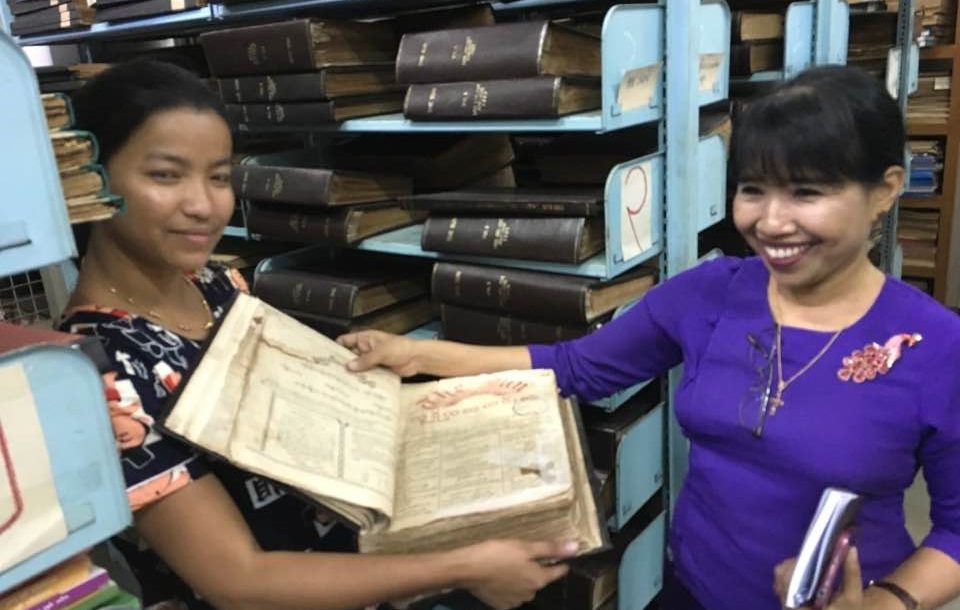Universities in Myanmar have been through decades of challenging times, with closures and limited links to the world. As New Mandala‘s co-founder Nicholas Farrelly has noted, since the rise of Daw Aung San Suu Kyi, universities in Myanmar have become increasingly valued and able to connect with the world. He notes that ‘Many institutions are working hard to re-connect with Myanmar colleagues and support the improvement of local academic conditions’.
For university libraries, the new approach is a ray of hope. Myat Sann Nyien notes that ‘The years before 2011 were very dark, with all information cut off. Librarians in Myanmar worked in what felt like an enclosed society, and libraries in Myanmar were lacking new and updated materials and facilities’.
Connections to the world through university libraries are an important feature of this rebirth of higher education. Libraries in Myanmar institutions have, together with the National Library, collected the memory of the nation, curated through many collections of palm leaf manuscripts and rare historic texts. The University libraries aspire to deliver collections and services that will create greater research and education outcomes.
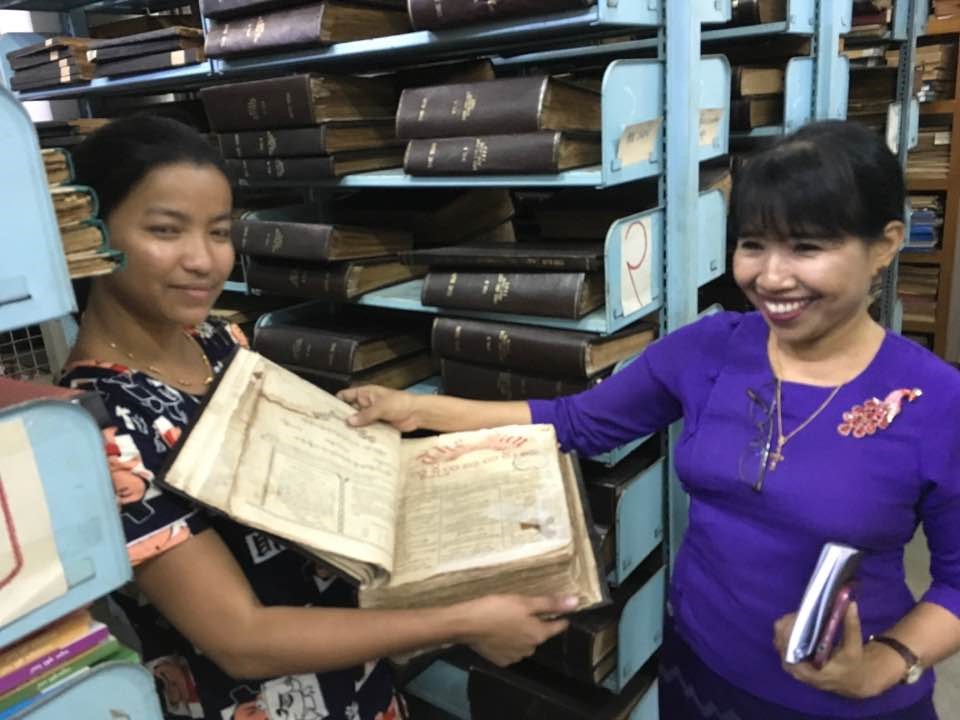
Ms Ni Ni Naing, Librarian, Universities Central Library, University of Yangon Campus, with some rare newspapers.
The digital environment offers great opportunities. It is a mechanism to connect students and researchers with resources from around the world. It also provides many challenges. Accessing resources requires new delivery systems and funding. Myanmar universities have limited budgets and face many technical challenges, but an exciting project is opening up access to scholarly resources.
It is inspiring to see the eLibrary Myanmar project, funded by the Open Society Foundations and initiated in December 2013, providing information literacy training to librarians in 10 academic and research institutions, as well as granting access to a great range of high quality international journals, databases and e-books.

At University of Yangon Library with Dr Hlaing Hlaing Gyi, Librarian, University of Yangon Library on my right and Professor Dr. Ni Win Zaw, Head, Department of Library and Information Science, University of Yangon and Dr Ohn Mar Oo, Lecturer, Department of Library and Information Studies, University of Yangon.
In order to take advantages of these digital resources and develop digitisation activities for manuscript material, a new set of capabilities is required in library staff: digital literacy. This knowledge and expertise is vital to assist students and academics to harness the power of the digital world and develop knowledge for future research. The eLib project has provided training for some current librarians, but a major challenge is creating the new capabilities in library and information science students—the future library staff and leaders who will foster the next changes and create a digitally capable set of university graduates.
The Australian National University and Myanmar have a long history of collaboration on a range of research areas. The ANU Library is now participating in a project with the University of Yangon Department of Library and Information Science to develop their programs to enable students to develop digital capabilities.
The librarians are enthusiastic about taking advantage of the digital environment to enable students and academics to access the world’s research and to develop competencies in digital literacy now that Myanmar is opening up to engagement with the world. They are very concerned that without these changes Myanmar will not be able to deliver quality education, and that education and research will fail to reach good standards.
Dr Ni Win Zaw, head of the University of Yangon Department of Library and Information Science hosted my visit late last year. It was a wonderful opportunity to see the university libraries and understand their needs for new skills. The students were delightful, passionate and ready to take up every opportunity to increase their digitial information skills.
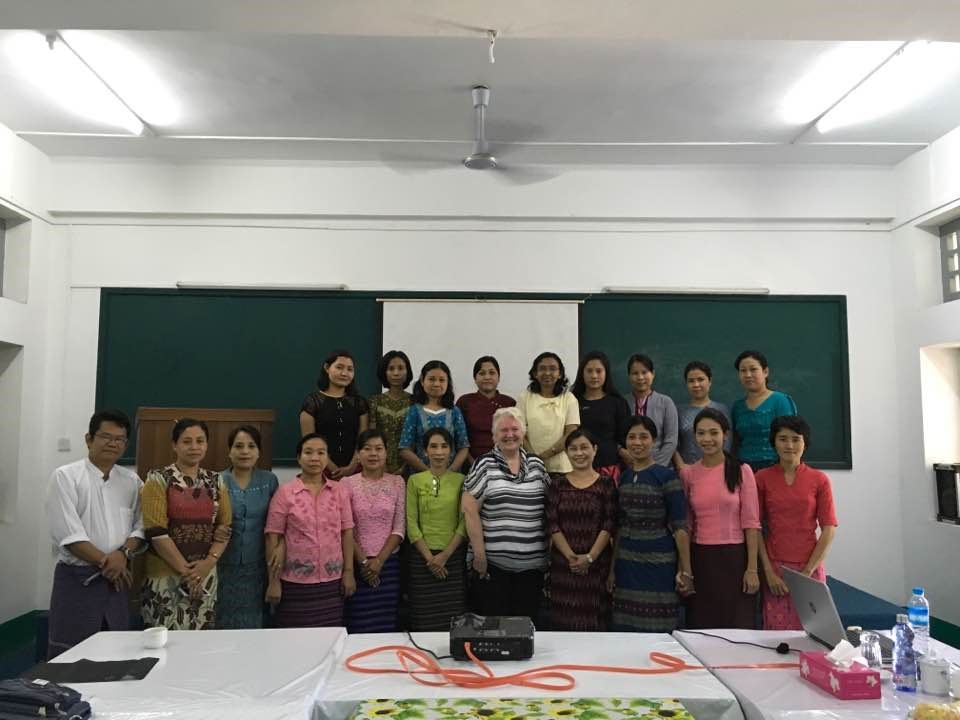
Postgraduate Students and lecturers at the Department of Library and Information Science, University of Yangon.
At the Myanmar-Australian Strategic Dialogue and the University of Yangon/Australian National University research conference in March, the importance of developing these skills was recognised. The Strategic Dialogue commenced with speeches from Ministers including the Australian Minister for International Development and the Pacific, Senator the Hon Concetta Fierravanti-Wells.
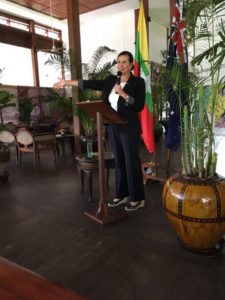
Senator the Hon Concetta Fierravanti-Wells speaking at the commencement of the Strategic Dialogue.
Dr Zaw visited Australia in April to further her understanding of library education in Australia and digital skills, accessing valuable time and support from many, including Charles Sturt University lecturers and Professor Sally Burford at the University of Canberra.
For Myanmar universities the digital environment offers new opportunities, but also many challenges. University libraries offer but few terminals and internet bandwidth is poor. The activities both through the eLib project and supporting incorporating digital competencies into library education are vital to assist Myanmar develop modern universities and link to world class research.
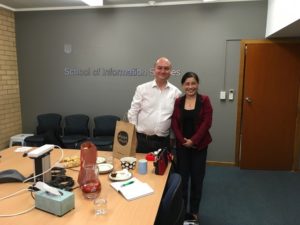
Professor Philip Hider, Head of School, School of Information Studies and Dr Zaw during her visit to Charles Sturt University.
This transformative approach provides the impetus to overcome what has been a significant limitation of university practice in Myanmar—but it will need many years and much support. Nyein notes, ‘the role of librarians and libraries had been ignored for five decades’. Major work is required to change practices to the benefit of future generations. The contribution through those organising the consortium for the eLib project, the leadership of current university librarians, volunteers and reforming library education are steps that will assist Myanmar’s universities to flourish and better join the worlds research network.
……………
Roxanne Missingham is University Librarian at the Australian National University. She previously held roles at the Parliamentary Library and the National Library of Australia.
 Facebook
Facebook  Twitter
Twitter  Soundcloud
Soundcloud  Youtube
Youtube  Rss
Rss 